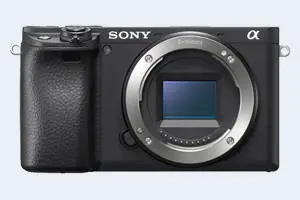Pentax K-30 vs Sony A6400
The Pentax K-30 and the Sony Alpha A6400 are two digital cameras that were revealed to the public, respectively, in May 2012 and January 2019. The K-30 is a DSLR, while the A6400 is a mirrorless interchangeable lens camera. Both cameras are equipped with an APS-C sensor. The Pentax has a resolution of 16.1 megapixels, whereas the Sony provides 24 MP.
Below is an overview of the main specs of the two cameras as a starting point for the comparison.

Check K-30 offers at
ebay.com

Check A6400 price at
amazon.com
Going beyond this snapshot of core features and characteristics, what are the differences between the Pentax K-30 and the Sony Alpha A6400? Which one should you buy? Read on to find out how these two cameras compare with respect to their body size, their imaging sensors, their shooting features, their input-output connections, and their reception by expert reviewers.
Body comparison
The physical size and weight of the Pentax K-30 and the Sony A6400 are illustrated in the side-by-side display below. The two cameras are presented according to their relative size. Three consecutive views from the front, the top, and the rear side are shown. All width, height and depth dimensions are rounded to the nearest millimeter.
The K-30 can be obtained in seven different colors (black, silver, blue, red, yellow, green, white), while the A6400 is only available in black.
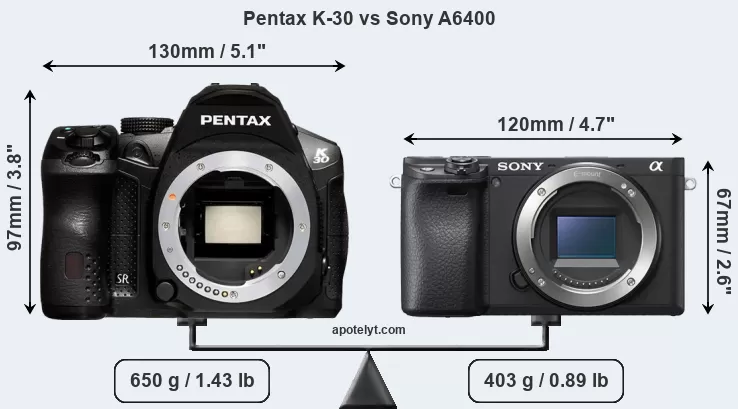
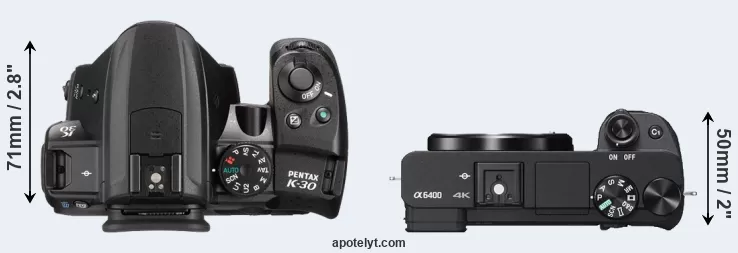
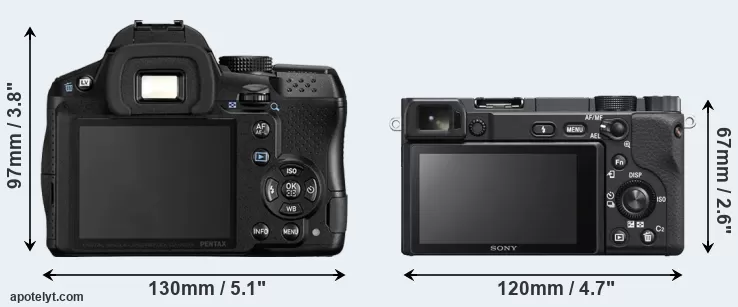
If the front view area (width x height) of the cameras is taken as an aggregate measure of their size, the Sony A6400 is considerably smaller (36 percent) than the Pentax K-30. Moreover, the A6400 is substantially lighter (38 percent) than the K-30. In this context, it is worth noting that both cameras are splash and dust-proof and can, hence, be used in inclement weather conditions or harsh environments.
The above size and weight comparisons are to some extent incomplete since they do not consider the interchangeable lenses that both of these cameras require. Hence, you might want to study and compare the specifications of available lenses in order to get the full picture of the size and weight of the two camera systems.
The power pack in the A6400 can be charged via the USB port, which can be very convenient when travelling.
The following table provides a synthesis of the main physical specifications of the two cameras and other similar ones. If you want to switch the focus of the display and review another camera pair, you can move across to the CAM-parator tool and choose from the broad selection of possible camera comparisons there.

| Camera Model |
Camera Width |
Camera Height |
Camera Depth |
Camera Weight |
Battery Life |
Weather Sealing |
Camera Launch |
Launch Price (USD) |
Street Price |
||
|---|---|---|---|---|---|---|---|---|---|---|---|
| 1. | Pentax K-30 | 130 mm | 97 mm | 71 mm | 650 g | 410 | Y | May 2012 | 849 | ebay.com | |
| 2. | Sony A6400 | 120 mm | 67 mm | 50 mm | 403 g | 410 | Y | Jan 2019 | 899 | amazon.com | |
| 3. | Nikon D5300 | 125 mm | 98 mm | 76 mm | 480 g | 600 | n | Oct 2013 | 799 | ebay.com | |
| 4. | Pentax K-3 | 131 mm | 100 mm | 77 mm | 800 g | 560 | Y | Oct 2013 | 1,299 | ebay.com | |
| 5. | Pentax K-3 II | 131 mm | 100 mm | 77 mm | 800 g | 720 | Y | Apr 2015 | 1,099 | ebay.com | |
| 6. | Pentax K-5 | 131 mm | 97 mm | 73 mm | 760 g | 740 | Y | Sep 2010 | 1,099 | ebay.com | |
| 7. | Pentax K-5 II | 131 mm | 97 mm | 73 mm | 760 g | 740 | Y | Sep 2012 | 1,099 | ebay.com | |
| 8. | Pentax K-50 | 130 mm | 97 mm | 71 mm | 650 g | 410 | Y | Jun 2013 | 599 | ebay.com | |
| 9. | Pentax K-500 | 130 mm | 97 mm | 71 mm | 646 g | 710 | n | Jun 2013 | 549 | ebay.com | |
| 10. | Pentax KP | 132 mm | 101 mm | 76 mm | 703 g | 390 | Y | Jan 2017 | 1,099 | ebay.com | |
| 11. | Pentax K-S1 | 121 mm | 93 mm | 70 mm | 558 g | 410 | n | Aug 2014 | 749 | ebay.com | |
| 12. | Pentax K-S2 | 123 mm | 91 mm | 73 mm | 678 g | 410 | Y | Feb 2015 | 749 | ebay.com | |
| 13. | Sony A77 | 143 mm | 104 mm | 81 mm | 732 g | 470 | Y | Aug 2011 | 1,399 | ebay.com | |
| 14. | Sony A5100 | 110 mm | 63 mm | 36 mm | 283 g | 400 | n | Aug 2014 | 549 | ebay.com | |
| 15. | Sony A6000 | 120 mm | 67 mm | 45 mm | 344 g | 360 | n | Feb 2014 | 599 | ebay.com | |
| 16. | Sony A6100 | 120 mm | 67 mm | 59 mm | 396 g | 420 | n | Aug 2019 | 749 | ebay.com | |
| 17. | Sony A6300 | 120 mm | 67 mm | 49 mm | 404 g | 400 | Y | Feb 2016 | 999 | ebay.com | |
| Note: Measurements and pricing do not include easily detachable parts, such as add-on or interchangeable lenses or optional viewfinders. | |||||||||||
Any camera decision will naturally be influenced heavily by the price. The retail prices at the time of the camera’s release place the model in the market relative to other models in the producer’s line-up and the competition. The K-30 was somewhat cheaper (by 6 percent) than the A6400 at launch, but both cameras fall into the same price category. Normally, street prices remain initially close to the MSRP, but after a couple of months, the first discounts appear. Later in the product cycle and, in particular, when the replacement model is about to appear, further discounting and stock clearance sales often push the camera price considerably down.
Sensor comparison
The imaging sensor is at the core of digital cameras and its size is one of the main determining factors of image quality. A large sensor will tend to have larger individual pixels that provide better low-light sensitivity, wider dynamic range, and richer color-depth than smaller pixel-units in a sensor of the same technological generation. Furthermore, a large sensor camera will give the photographer more possibilities to use shallow depth-of-field in order to isolate a subject from the background. On the downside, larger sensors tend to be more expensive and lead to bigger and heavier cameras and lenses.
Both cameras under consideration feature an APS-C sensor, but their sensors differ slightly in size. The sensor area in the A6400 is 1 percent smaller. They nevertheless have the same format factor of 1.5. Both cameras have a native aspect ratio (sensor width to sensor height) of 3:2.
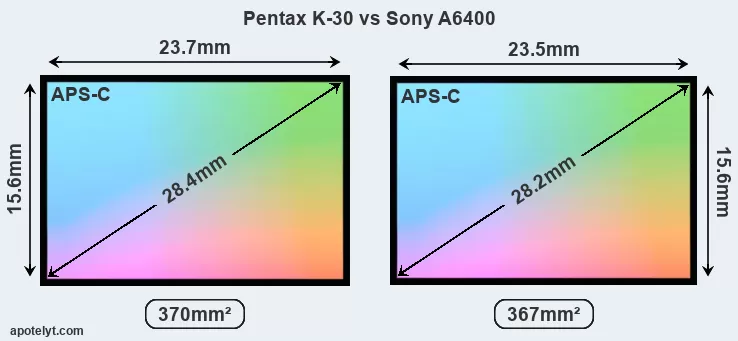
Despite having a slightly smaller sensor, the A6400 offers a higher resolution of 24 megapixels, compared with 16.1 MP of the K-30. This megapixels advantage comes at the cost of a higher pixel density and a smaller size of the individual pixel (with a pixel pitch of 3.91μm versus 4.79μm for the K-30). However, it should be noted that the A6400 is much more recent (by 6 years and 7 months) than the K-30, and its sensor will have benefitted from technological advances during this time that make it possible to gather light more efficiently.
The resolution advantage of the Sony A6400 implies greater flexibility for cropping images or the possibility to print larger pictures. The maximum print size of the A6400 for good quality output (200 dots per inch) amounts to 30 x 20 inches or 76.2 x 50.8 cm, for very good quality (250 dpi) 24 x 16 inches or 61 x 40.6 cm, and for excellent quality (300 dpi) 20 x 13.3 inches or 50.8 x 33.9 cm. The corresponding values for the Pentax K-30 are 24.6 x 16.3 inches or 62.6 x 41.5 cm for good quality, 19.7 x 13.1 inches or 50.1 x 33.2 cm for very good quality, and 16.4 x 10.9 inches or 41.7 x 27.6 cm for excellent quality prints.
The A6400 has on-sensor phase detect pixels, which results in fast and reliable autofocus acquisition even during live view operation.
The Pentax K-30 has a native sensitivity range from ISO 100 to ISO 12800, which can be extended to ISO 100-25600. The corresponding ISO settings for the Sony Alpha A6400 are ISO 100 to ISO 32000, with the possibility to increase the ISO range to 100-102400.
Technology-wise, both cameras are equipped with CMOS (Complementary Metal–Oxide–Semiconductor) sensors. Both cameras use a Bayer filter for capturing RGB colors on a square grid of photosensors. This arrangement is found in most digital cameras.
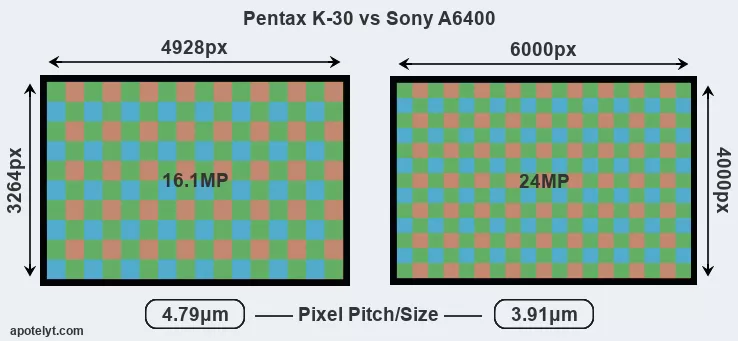
Consistent information on actual sensor performance is available from DXO Mark for many cameras. This service assesses and scores the color depth ("DXO Portrait"), dynamic range ("DXO Landscape"), and low-light sensitivity ("DXO Sports") of camera sensors, and also publishes an overall camera score. Of the two cameras under consideration, the A6400 has a markedly higher DXO score than the K-30 (overall score 4 points higher), which will translate into better image quality. The advantage is based on 0.3 bits higher color depth, 0.6 EV in additional dynamic range, and 0.3 stops in additional low light sensitivity. The adjacent table reports on the physical sensor characteristics and the outcomes of the DXO sensor quality tests for a sample of comparator-cameras.

| Camera Model |
Sensor Class |
Resolution (MP) |
Horiz. Pixels |
Vert. Pixels |
Video Format |
DXO Portrait |
DXO Landscape |
DXO Sports |
DXO Overall |
||
|---|---|---|---|---|---|---|---|---|---|---|---|
| 1. | Pentax K-30 | APS-C | 16.1 | 4928 | 3264 | 1080/30p | 23.7 | 13.0 | 1129 | 79 | |
| 2. | Sony A6400 | APS-C | 24.0 | 6000 | 4000 | 4K/30p | 24.0 | 13.6 | 1431 | 83 | |
| 3. | Nikon D5300 | APS-C | 24.0 | 6000 | 4000 | 1080/60p | 24.0 | 13.9 | 1338 | 83 | |
| 4. | Pentax K-3 | APS-C | 24.1 | 6016 | 4000 | 1080/60i | 23.7 | 13.4 | 1216 | 80 | |
| 5. | Pentax K-3 II | APS-C | 24.1 | 6016 | 4000 | 1080/60i | 23.6 | 13.6 | 1106 | 80 | |
| 6. | Pentax K-5 | APS-C | 16.1 | 4928 | 3264 | 1080/25p | 23.7 | 14.1 | 1162 | 82 | |
| 7. | Pentax K-5 II | APS-C | 16.1 | 4928 | 3264 | 1080/25p | 23.8 | 14.1 | 1235 | 82 | |
| 8. | Pentax K-50 | APS-C | 16.1 | 4928 | 3264 | 1080/30p | 23.7 | 13.0 | 1120 | 79 | |
| 9. | Pentax K-500 | APS-C | 16.1 | 4928 | 3264 | 1080/30p | 23.7 | 13.1 | 1087 | 79 | |
| 10. | Pentax KP | APS-C | 24.1 | 6016 | 4000 | 1080/60i | 23.9 | 13.2 | 1699 | 81 | |
| 11. | Pentax K-S1 | APS-C | 20.0 | 5472 | 3648 | 1080/30p | 23.5 | 13.0 | 1061 | 78 | |
| 12. | Pentax K-S2 | APS-C | 20.0 | 5472 | 3648 | 1080/30p | 23.6 | 12.9 | 1514 | 79 | |
| 13. | Sony A77 | APS-C | 24.0 | 6000 | 4000 | 1080/60p | 24.0 | 13.2 | 801 | 78 | |
| 14. | Sony A5100 | APS-C | 24.0 | 6000 | 4000 | 1080/60p | 23.8 | 12.7 | 1347 | 80 | |
| 15. | Sony A6000 | APS-C | 24.0 | 6000 | 4000 | 1080/60p | 24.1 | 13.1 | 1347 | 82 | |
| 16. | Sony A6100 | APS-C | 24.0 | 6000 | 4000 | 4K/30p | 24.1 | 13.6 | 1947 | 84 | |
| 17. | Sony A6300 | APS-C | 24.0 | 6000 | 4000 | 4K/30p | 24.4 | 13.7 | 1437 | 85 | |
| Note: DXO values in italics represent estimates based on sensor size and age. | |||||||||||
Many modern cameras are not only capable of taking still images, but also of capturing video footage. The two cameras under consideration both have sensors whose read-out speed is fast enough to capture moving pictures, but the A6400 provides a better video resolution than the K-30. It can shoot movie footage at 4K/30p, while the Pentax is limited to 1080/30p.
Feature comparison
Apart from body and sensor, cameras can and do differ across a variety of features. For example, the A6400 has an electronic viewfinder (2359k dots), while the K-30 has an optical one. Both systems have their advantages, with the electronic viewfinder making it possible to project supplementary shooting information into the framing view, whereas the optical viewfinder offers lag-free viewing and a very clear framing image. The viewfinders of both cameras offer the same field of view (100%), but the viewfinder of the A6400 has a higher magnification than the one of the K-30 (0.70x vs 0.61x), so that the size of the image transmitted appears closer to the size seen with the naked human eye. The following table reports on some other key feature differences and similarities of the Pentax K-30, the Sony A6400, and comparable cameras.

| Camera Model |
Viewfinder (Type or 000 dots) |
Control Panel (yes/no) |
LCD Specifications (inch/000 dots) |
LCD Attach- ment |
Touch Screen (yes/no) |
Max Shutter Speed * |
Max Shutter Flaps * |
Built-in Flash (yes/no) |
Built-in Image Stab |
||
|---|---|---|---|---|---|---|---|---|---|---|---|
| 1. | Pentax K-30 | optical | n | 3.0 / 921 | fixed | n | 1/6000s | 6.0/s | Y | Y | |
| 2. | Sony A6400 | 2359 | n | 3.0 / 922 | tilting | Y | 1/4000s | 11.0/s | Y | n | |
| 3. | Nikon D5300 | optical | n | 3.2 / 1037 | swivel | n | 1/4000s | 5.0/s | Y | n | |
| 4. | Pentax K-3 | optical | Y | 3.2 / 1037 | fixed | n | 1/8000s | 8.3/s | Y | Y | |
| 5. | Pentax K-3 II | optical | Y | 3.2 / 1037 | fixed | n | 1/8000s | 8.3/s | n | Y | |
| 6. | Pentax K-5 | optical | Y | 3.0 / 921 | fixed | n | 1/8000s | 7.0/s | Y | Y | |
| 7. | Pentax K-5 II | optical | Y | 3.0 / 921 | fixed | n | 1/8000s | 7.0/s | Y | Y | |
| 8. | Pentax K-50 | optical | n | 3.0 / 921 | fixed | n | 1/6000s | 6.0/s | Y | Y | |
| 9. | Pentax K-500 | optical | n | 3.0 / 921 | fixed | n | 1/6000s | 6.0/s | Y | Y | |
| 10. | Pentax KP | optical | n | 3.0 / 921 | tilting | n | 1/6000s | 7.0/s | Y | Y | |
| 11. | Pentax K-S1 | optical | n | 3.0 / 921 | fixed | n | 1/6000s | 5.4/s | Y | Y | |
| 12. | Pentax K-S2 | optical | n | 3.0 / 921 | swivel | n | 1/6000s | 5.4/s | Y | Y | |
| 13. | Sony A77 | 2359 | Y | 3.0 / 921 | full-flex | n | 1/8000s | 12.0/s | Y | Y | |
| 14. | Sony A5100 | none | n | 3.0 / 922 | tilting | Y | 1/4000s | 6.0/s | Y | n | |
| 15. | Sony A6000 | 1440 | n | 3.0 / 922 | tilting | n | 1/4000s | 11.0/s | Y | n | |
| 16. | Sony A6100 | 1440 | n | 3.0 / 922 | tilting | Y | 1/4000s | 11.0/s | Y | n | |
| 17. | Sony A6300 | 2359 | n | 3.0 / 922 | tilting | n | 1/4000s | 11.0/s | Y | n | |
| Note: *) Information refers to the mechanical shutter, unless the camera only has an electronic one. | |||||||||||
One feature that differentiates the K-30 and the A6400 is in-body image stabilization (IBIS). The K-30 reduces the risk of handshake-induced blur with all attached lenses, while the A6400 offers no blur reduction with lenses that themselves do not provide optical image stabilization.
The A6400 has an articulated screen that can be turned to be front-facing. This characteristic will be appreciated by vloggers and photographers who are interested in taking selfies. In contrast, the K-30 does not have a selfie-screen.The reported shutter speed information refers to the use of the mechanical shutter. Yet, some cameras only have an electronic shutter, while others have an electronic shutter in addition to a mechanical one. In fact, the A6400 is one of those camera that have an additional electronic shutter, which makes completely silent shooting possible. However, this mode is less suitable for photographing moving objects (risk of rolling shutter) or shooting under artificial light sources (risk of flickering).
The K-30 writes its imaging data to SDXC cards, while the A6400 uses SDXC or Memory Stick PRO Duo cards. The A6400 supports UHS-I cards (Ultra High Speed data transfer of up to 104 MB/s), while the K-30 cannot take advantage of Ultra High Speed SD cards.
Connectivity comparison
For some imaging applications, the extent to which a camera can communicate with its environment can be an important aspect in the camera decision process. The table below provides an overview of the connectivity of the Pentax K-30 and Sony Alpha A6400 and, in particular, the interfaces the cameras (and selected comparators) provide for accessory control and data transfer.

| Camera Model |
Hotshoe Port |
Internal Mic / Speaker |
Microphone Port |
Headphone Port |
HDMI Port |
USB Port |
WiFi Support |
NFC Support |
Bluetooth Support |
||
|---|---|---|---|---|---|---|---|---|---|---|---|
| 1. | Pentax K-30 | Y | mono / mono | - | - | - | 2.0 | - | - | - | |
| 2. | Sony A6400 | Y | stereo / mono | Y | - | micro | 2.0 | Y | Y | Y | |
| 3. | Nikon D5300 | Y | stereo / mono | Y | - | mini | 2.0 | Y | - | - | |
| 4. | Pentax K-3 | Y | mono / mono | Y | Y | mini | 3.0 | - | - | - | |
| 5. | Pentax K-3 II | Y | mono / mono | Y | Y | mini | 3.0 | - | - | - | |
| 6. | Pentax K-5 | Y | stereo / mono | Y | - | mini | 2.0 | - | - | - | |
| 7. | Pentax K-5 II | Y | stereo / mono | Y | - | mini | 2.0 | - | - | - | |
| 8. | Pentax K-50 | Y | mono / mono | - | - | micro | 2.0 | - | - | - | |
| 9. | Pentax K-500 | Y | mono / mono | - | - | - | 2.0 | - | - | - | |
| 10. | Pentax KP | Y | stereo / mono | Y | - | - | 2.0 | Y | - | - | |
| 11. | Pentax K-S1 | Y | stereo / mono | - | - | micro | 2.0 | - | - | - | |
| 12. | Pentax K-S2 | Y | mono / mono | Y | - | micro | 2.0 | Y | Y | - | |
| 13. | Sony A77 | Y | stereo / mono | Y | - | mini | 2.0 | - | - | - | |
| 14. | Sony A5100 | - | stereo / mono | - | - | micro | 2.0 | Y | Y | - | |
| 15. | Sony A6000 | Y | stereo / mono | - | - | micro | 2.0 | Y | Y | - | |
| 16. | Sony A6100 | Y | stereo / mono | Y | - | micro | 2.0 | Y | Y | Y | |
| 17. | Sony A6300 | Y | stereo / mono | Y | - | micro | 2.0 | Y | Y | - |
It is notable that the A6400 offers wifi support, which can be a very convenient means to transfer image data to an off-camera location. In contrast, the K-30 does not provide wifi capability.
The A6400 is a recent model that features in the current product line-up of Sony. In contrast, the K-30 has been discontinued (but can be found pre-owned on ebay). As a replacement in the same line of cameras, the K-30 was succeeded by the Pentax K-50. Further information on the features and operation of the K-30 and A6400 can be found, respectively, in the Pentax K-30 Manual (free pdf) or the online Sony A6400 Manual.
Review summary
So what conclusions can be drawn? Which of the two cameras – the Pentax K-30 or the Sony A6400 – has the upper hand? Is one clearly better than the other? The listing below highlights the relative strengths of the two models.

Reasons to prefer the Pentax K-30:
- Brighter framing: Features an optical viewfinder for clear, lag-free composition.
- Faster shutter: Has higher mechanical shutter speed (1/6000s vs 1/4000s) to freeze action.
- Sharper images: Has hand-shake reducing image stabilization built-in.
- More heavily discounted: Has been available for much longer (launched in May 2012).

Arguments in favor of the Sony Alpha A6400:
- More detail: Has more megapixels (24 vs 16.1MP), which boosts linear resolution by 22%.
- Better image quality: Scores markedly higher (4 points) in the DXO overall evaluation.
- More dynamic range: Captures a broader range of light and dark details (0.6 EV of extra DR).
- Better low-light sensitivity: Can shoot in dim conditions (0.3 stops ISO advantage).
- Better video: Provides higher definition movie capture (4K/30p vs 1080/30p).
- Better live-view autofocus: Features on-sensor phase-detection for more confident autofocus.
- Better sound: Can connect to an external microphone for higher quality sound recording.
- More framing info: Has an electronic viewfinder that displays shooting data.
- Larger viewfinder image: Features a viewfinder with a higher magnification (0.70x vs 0.61x).
- More flexible LCD: Has a tilting screen for odd-angle shots in landscape orientation.
- Fewer buttons to press: Has a touchscreen to facilitate handling and shooting adjustments.
- More selfie-friendly: Has an articulated screen that can be turned to be front-facing.
- Faster burst: Shoots at higher frequency (11 vs 6 flaps/sec) to capture the decisive moment.
- Less disturbing: Has an electronic shutter option for completely silent shooting.
- More compact: Is smaller (120x67mm vs 130x97mm) and will fit more readily into a bag.
- Less heavy: Has a lower weight (by 247g or 38 percent) and is thus easier to take along.
- Easier travel charging: Can be conveniently charged via its USB port.
- More legacy lens friendly: Can use many non-native lenses via adapters.
- Easier file upload: Has wifi built in for automatic backup or image transfer to the web.
- Easier device pairing: Supports NFC for fast wireless image transfer over short distances.
- Easier wireless transfer: Supports Bluetooth for image sharing without cables.
- Faster buffer clearing: Has an SD card interface that supports the UHS-I standard.
- More modern: Reflects 6 years and 7 months of technical progress since the K-30 launch.
If the count of individual advantages (bullet points above) is taken as a guide, the A6400 is the clear winner of the contest (23 : 4 points). However, the relevance of individual strengths will vary across photographers, so that you might want to apply your own weighing scheme to the summary points when reflecting and deciding on a new camera. A professional wildlife photographer will view the differences between cameras in a way that diverges from the perspective of a family photog, and a person interested in architecture has distinct needs from a sports shooter. Hence, the decision which camera is best and worth buying is often a very personal one.
How about other alternatives? Do the specifications of the Pentax K-30 and the Sony A6400 place the cameras among the top in their class? Find out in the latest Best DSLR Camera and Best Mirrorless Interchangeable Lens Camera listings whether the two cameras rank among the cream of the crop.
In any case, while the comparison of the spec-sheets of cameras can offer a general idea of their imaging potential, it remains partial and cannot reveal, for example, the shooting experience and imaging performance when actually working with the K-30 or the A6400. User reviews that are available, for instance, at amazon can sometimes shed light on these issues, but such feedback is all too often partial, inconsistent, and inaccurate.
Expert reviews
This is why expert reviews are important. The adjacent summary-table relays the overall verdicts of several of the most popular camera review sites (amateurphotographer [AP], cameralabs [CL], digitalcameraworld [DCW], dpreview [DPR], ephotozine [EPZ], photographyblog [PB]). As can be seen, the professional reviewers agree in many cases on the quality of different cameras, but sometimes their assessments diverge, reinforcing the earlier point that a camera decision is often a very personal choice.

| Camera Model |
AP score |
CL score |
DCW score |
DPR score |
EPZ score |
PB score |
Camera Launch |
Launch Price (USD) |
Street Price |
||
|---|---|---|---|---|---|---|---|---|---|---|---|
| 1. | Pentax K-30 | 4/5 | .. | .. | 78/100 | 4.5/5 | 4.5/5 | May 2012 | 849 | ebay.com | |
| 2. | Sony A6400 | 4/5 | + | 4/5 | 85/100 | 4.5/5 | 4/5 | Jan 2019 | 899 | amazon.com | |
| 3. | Nikon D5300 | 4/5 | + + | .. | 79/100 | 4.5/5 | 4.5/5 | Oct 2013 | 799 | ebay.com | |
| 4. | Pentax K-3 | 4/5 | .. | .. | 83/100 | 5/5 | 5/5 | Oct 2013 | 1,299 | ebay.com | |
| 5. | Pentax K-3 II | 4.5/5 | .. | .. | .. | 5/5 | 5/5 | Apr 2015 | 1,099 | ebay.com | |
| 6. | Pentax K-5 | 4/5 | .. | .. | 83/100 | 5/5 | 4.5/5 | Sep 2010 | 1,099 | ebay.com | |
| 7. | Pentax K-5 II | 5/5 | .. | .. | 80/100 | 5/5 | 4.5/5 | Sep 2012 | 1,099 | ebay.com | |
| 8. | Pentax K-50 | 5/5 | .. | .. | .. | 5/5 | 4.5/5 | Jun 2013 | 599 | ebay.com | |
| 9. | Pentax K-500 | .. | .. | .. | .. | 4.5/5 | 4.5/5 | Jun 2013 | 549 | ebay.com | |
| 10. | Pentax KP | 4/5 | .. | 3/5 | 82/100 | 5/5 | 4.5/5 | Jan 2017 | 1,099 | ebay.com | |
| 11. | Pentax K-S1 | 4/5 | .. | .. | .. | 4.5/5 | 4/5 | Aug 2014 | 749 | ebay.com | |
| 12. | Pentax K-S2 | 4.5/5 | .. | .. | .. | 5/5 | 4.5/5 | Feb 2015 | 749 | ebay.com | |
| 13. | Sony A77 | 5/5 | 91/100 | .. | 81/100 | .. | 5/5 | Aug 2011 | 1,399 | ebay.com | |
| 14. | Sony A5100 | 4.5/5 | + | .. | .. | 4.5/5 | 5/5 | Aug 2014 | 549 | ebay.com | |
| 15. | Sony A6000 | 5/5 | + | 4.5/5 | 80/100 | 4.5/5 | 5/5 | Feb 2014 | 599 | ebay.com | |
| 16. | Sony A6100 | .. | .. | 4/5 | 82/100 | 4/5 | 5/5 | Aug 2019 | 749 | ebay.com | |
| 17. | Sony A6300 | 4.5/5 | + | .. | 85/100 | 5/5 | 5/5 | Feb 2016 | 999 | ebay.com | |
| Note: (+ +) highly recommended; (+) recommended; (o) reviewed; (..) not available. | |||||||||||
The above review scores should be interpreted with care, though. The assessments were made in relation to similar cameras of the same technological generation. Thus, a score needs to be put into the context of the launch date and the launch price of the camera, and comparisons of ratings among very different cameras or across long time periods have little meaning. Also, please note that some of the review sites have changed their methodology and reporting over time.

Check K-30 offers at
ebay.com

Check A6400 price at
amazon.com
Other camera comparisons
Did this review help to inform your camera decision process? In case you would like to check on the differences and similarities of other camera models, just make your choice using the following search menu. There is also a set of direct links to comparison reviews that other users of the CAM-parator app explored.
- Canon 400D vs Sony A6400
- Canon 550D vs Sony A6400
- Fujifilm X-H2S vs Pentax K-30
- Fujifilm X-Pro3 vs Pentax K-30
- Fujifilm X-T4 vs Sony A6400
- Nikon 1 J5 vs Sony A6400
- Nikon D4S vs Sony A6400
- Nikon Z7 vs Pentax K-30
- Pentax K-30 vs Pentax K-S1
- Pentax K-30 vs Sony A1
- Pentax K-30 vs Sony A7R III
- Sony A6400 vs Sony RX100
Specifications: Pentax K-30 vs Sony A6400
Below is a side-by-side comparison of the specs of the two cameras to facilitate a quick review of their differences and common features.
| Camera Model | Pentax K-30 | Sony A6400 |
|---|---|---|
| Camera Type | Digital single lens reflex | Mirrorless system camera |
| Camera Lens | Pentax K mount lenses | Sony E mount lenses |
| Launch Date | May 2012 | January 2019 |
| Launch Price | USD 849 | USD 899 |
| Sensor Specs | Pentax K-30 | Sony A6400 |
| Sensor Technology | CMOS | CMOS |
| Sensor Format | APS-C Sensor | APS-C Sensor |
| Sensor Size | 23.7 x 15.6 mm | 23.5 x 15.6 mm |
| Sensor Area | 369.72 mm2 | 366.6 mm2 |
| Sensor Diagonal | 28.4 mm | 28.2 mm |
| Crop Factor | 1.5x | 1.5x |
| Sensor Resolution | 16.1 Megapixels | 24 Megapixels |
| Image Resolution | 4928 x 3264 pixels | 6000 x 4000 pixels |
| Pixel Pitch | 4.79 μm | 3.91 μm |
| Pixel Density | 4.35 MP/cm2 | 6.55 MP/cm2 |
| Moiré control | Anti-Alias filter | Anti-Alias filter |
| Movie Capability | 1080/30p Video | 4K/30p Video |
| ISO Setting | 100 - 12,800 ISO | 100 - 32,000 ISO |
| ISO Boost | 100 - 25,600 ISO | 100 - 102,400 ISO |
| Image Processor | PRIME M | BIONZ X |
| DXO Sensor Quality (score) | 79 | 83 |
| DXO Color Depth (bits) | 23.7 | 24 |
| DXO Dynamic Range (EV) | 13.0 | 13.6 |
| DXO Low Light (ISO) | 1129 | 1431 |
| Screen Specs | Pentax K-30 | Sony A6400 |
| Viewfinder Type | Optical viewfinder | Electronic viewfinder |
| Viewfinder Field of View | 100% | 100% |
| Viewfinder Magnification | 0.61x | 0.70x |
| Viewfinder Resolution | 2359k dots | |
| LCD Framing | Live View | Live View |
| Rear LCD Size | 3.0inch | 3.0inch |
| LCD Resolution | 921k dots | 922k dots |
| LCD Attachment | Fixed screen | Tilting screen |
| Touch Input | no Touchscreen | Touchscreen |
| Shooting Specs | Pentax K-30 | Sony A6400 |
| Focus System | Phase-detect AF | On-Sensor Phase-detect |
| Manual Focusing Aid | Focus Peaking | Focus Peaking |
| Max Shutter Speed (mechanical) | 1/6000s | 1/4000s |
| Continuous Shooting | 6 shutter flaps/s | 11 shutter flaps/s |
| Electronic Shutter | no E-Shutter | YES |
| Image Stabilization | In-body stabilization | Lens stabilization only |
| Fill Flash | Built-in Flash | Built-in Flash |
| Storage Medium | SDXC cards | MS or SDXC cards |
| Single or Dual Card Slots | Single card slot | Single card slot |
| UHS card support | no | UHS-I |
| Connectivity Specs | Pentax K-30 | Sony A6400 |
| External Flash | Hotshoe | Hotshoe |
| USB Connector | USB 2.0 | USB 2.0 |
| HDMI Port | no HDMI | micro HDMI |
| Microphone Port | no MIC socket | External MIC port |
| Wifi Support | no Wifi | Wifi built-in |
| Near-Field Communication | no NFC | NFC built-in |
| Bluetooth Support | no Bluetooth | Bluetooth built-in |
| Body Specs | Pentax K-30 | Sony A6400 |
| Environmental Sealing | Weathersealed body | Weathersealed body |
| Battery Type | Pentax D-LI109 | Sony NP-FW50 |
| Battery Life (CIPA) | 410 shots per charge | 410 shots per charge |
| In-Camera Charging | no USB charging | USB charging |
| Body Dimensions |
130 x 97 x 71 mm (5.1 x 3.8 x 2.8 in) |
120 x 67 x 50 mm (4.7 x 2.6 x 2.0 in) |
| Camera Weight | 650 g (22.9 oz) | 403 g (14.2 oz) |

Check K-30 offers at
ebay.com

Check A6400 price at
amazon.com
Did you notice an error on this page? If so, please get in touch, so that we can correct the information.

